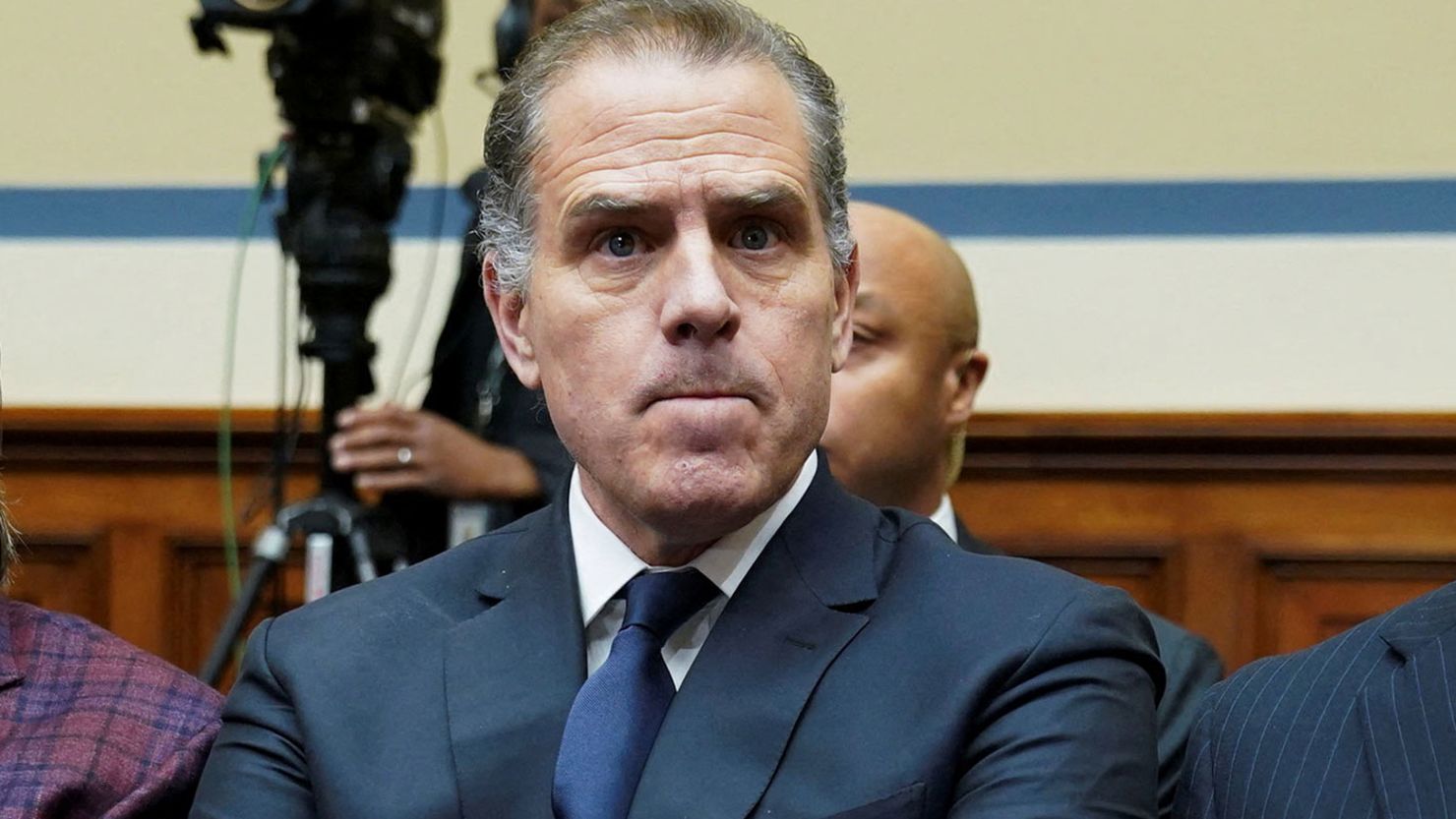Editor’s Note: Andrey Spektor is a former New York federal prosecutor. He is a litigation partner at the international law firm Bryan Cave Leighton Paisner. The views expressed in this commentary are his own. Read more opinion on CNN.
Hunter Biden won’t be returning to the spotlight next week as the House Oversight Committee had hoped. He declined Chairman James Comer’s invitation to publicly testify following a February closed-door Capitol Hill deposition before congressional Republicans as part of their impeachment inquiry into Hunter’s father, President Joe Biden.

Hunter Biden’s refusal to take part in the committee’s “circus act,” in the words of his attorney, comes after former FBI informant Alexander Smirnov was charged with lying about the Biden family’s overseas dealings and told investigators he was feeding the FBI information about the Biden family that had been provided by Russian intelligence officials. If you’ve served as a federal prosecutor long enough, then you’ve had confidential informants lie to you. That’s why you never bring charges based solely on their word; you corroborate them through and through, and you develop independent sources of evidence.
Smirnov had been touted as a cornerstone of the Republicans’ impeachment case, and observers are questioning whether there’s anything left in the Republican attacks given the demise of this key source. The problem with the Hunter Biden investigation, though, is not its potential reliance on the word of a compromised informant. We don’t know how much – if any – of the prosecution’s evidence came from Smirnov. And, to their credit, prosecutors did not hesitate to arrest him. Smirnov has pleaded not guilty.
Questions about Smirnov will be important to resolve, but they raise broader concerns about how prosecutors have treated Hunter Biden, especially in his most significant federal case involving tax charges. In December, he was charged in a nine-count indictment consisting of three felony and six misdemeanor tax offenses for alleged failures to pay and file taxes, tax evasion and filing false tax returns. According to the government, he faces a maximum sentence of 17 years, though the indictment correctly acknowledges that his practical exposure is less significant. He has pleaded not guilty.
The issue with that case was evident long before the latest developments. (Indeed, on its face, the tax indictment doesn’t appear to be tainted by Smirnov-provided information, and the closed-door deposition last month purported to focus on efforts to impeach Hunter Biden’s father instead of focusing on any charges pending against the younger Biden.) But it brings into focus the undue resources and attention that Hunter has received from prosecutors.
While the tax prosecution may be legally sound and constitutional, it is still deeply unfair. The investigation into the president’s son – much like those into former President Donald Trump – has become so politicized and polarizing that most people cannot seem to process any shades of gray or nuance. It has become a binary choice for most: witch hunt or crime of the century, a righteous prosecution or a political hit job, right or wrong.
The truth is, if Hunter Biden had a different father, he likely would not have been charged at all, and certainly not through the overkill of a sensationalized 56-page tax indictment. That doesn’t mean he didn’t commit the alleged crimes. It does mean that he is most likely being treated differently simply because of his last name.
Having worked with the Department of Justice Tax Division and prosecuted tax offenses, I know that for first-time offenders, the IRS would usually just impose financial penalties for late payments. In rarer cases, particularly where the conduct is egregious or involves tax returns of many individuals (like in cases of crooked tax preparers), an ambitious prosecutor might open a criminal investigation. More often than not, that investigation would be resolved with a non-prosecution agreement or deferred prosecution agreement – a promise not to pursue charges if the person behaves – or the type of misdemeanor plea to which Hunter and the government agreed last year before the deal fell apart.
But that’s not how this case was handled. And in that sense, Hunter Biden shares something in common with an unlikely person: Trump, at least with respect to his criminal case in New York.
Yes, if the allegations are true, then much of Hunter Biden’s recent life appears to have been filled with debauchery and crimes. Yes, at least some of those crimes are chargeable. And yes, if there was evidence that his father participated in any of those crimes, a deep and wide-ranging investigation would be worthwhile. But that is not this case.
Much like the gun charge against Hunter Biden, the tax indictment has left many former federal white-collar prosecutors like me scratching their heads. Tax charges, unlike their sexier wire fraud and money laundering cousins, are not prosecutors’ favorites.
In addition to the bureaucratic hurdles that must be cleared – the DOJ’s Tax Division must be consulted just to take routine investigatory steps – tax crimes generally require an elevated level of knowledge and intent by the perpetrator, the most difficult element to prove for any white-collar offense. It is not enough, for example, that a defendant simply failed to file tax returns, or that he did so knowingly; prosecutors must prove beyond a reasonable doubt that the failure was “willful.” If Hunter Biden fights this case through trial, a jury would have to find that he intentionally and voluntarily violated his duty to file taxes, and that his failure did not stem from a misunderstanding (however unreasonable) of the law.
The payoff for prosecutors, in most cases, is also not worth it. One of the factors that prosecutors must consider in deciding whether there is a “substantial federal interest” in bringing any charges is the likely sentence. But tax offenses do not, by themselves, produce heavy sentences – to say the least. In 2022 (the year of the latest available data), in the district where Hunter Biden has been charged, more defendants facing tax charges avoided any prison time than those who were incarcerated – a remarkable statistic but one in line with the rest of the nation. For the minority of defendants who received a prison sentence, the median term was just three months.
The indictment itself is also quite strange. First, it brings both felony and misdemeanor charges. Having charged and defended dozens of federal criminal cases, I know that’s unusual. Federal prosecutors do not often charge misdemeanors; there are enough felonies to choose from in the US Code, and federal prosecutors (unlike their state counterparts) are supposed to be more selective, focusing on the most worthwhile cases. Misdemeanors come in handy when attempting to resolve a problematic or a less serious federal case charged as a felony – a meeting in the middle for a defendant who should not go to prison but also should not get free pass. Charging misdemeanors and mixing them with felonies in the same indictment – while not entirely unprecedented – feels like someone throwing charges on paper in the hopes that one will stick.
Second, the indictment is filled with gratuitous details about Hunter Biden’s life. Does it matter that “instead of paying his taxes” he used money for adult entertainment? Money not used to pay taxes, after all, is usually put to other uses, scandalous or not. Even if cash sits under a pillow, it doesn’t make failure to pay taxes any less or more criminal. So is this indictment “plain” and “concise,” as the federal rules require, or was it designed to make a splash? Much of it will likely be struck as “surplusage” (unnecessary and prejudicial allegations).
The indictment also followed a prior plea deal with the government that unraveled mostly because Hunter Biden’s prior counsel and the assistant US attorney did not align on the terms of the plea deal before appearing in court. Those hiccups are often fixed with another court appearance, not with a massive new indictment.
Hunter Biden has been treated differently from almost any other person save for, perhaps, Trump – at least in New York, where the former president has been indicted on a novel and shaky legal theory reserved for it seems, Trump. That doesn’t mean that Trump or Hunter Biden are innocent; indeed, the former has more serious cases to contend with. But unequal treatment of our citizens, no matter how unethical or despicable they may be, is just as immoral.






